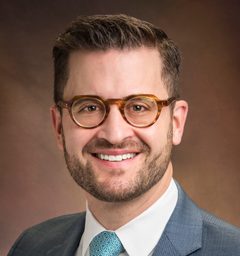
Gregory E. Tasian
MD, MSc, MSCE
University of Pennsylvania
Pediatric urologist Gregory Tasian, MD, MSc, MSCE, is dedicated to a practice of compassionate care for children and adolescents. He strives to make sure families know all the available treatment options for their child. And he supports shared decision-making with families when considering alternative treatments.
Dr. Tasian knew he wanted to be a surgeon from the time he was 7 years old. He loved using his mind and hands to “fix” things as a child. It wasn’t until medical school that he discovered that he wanted to become a urologist.
“Urology offers the opportunity to improve the quality of patient’s lives. Whether it be removing a kidney stone that is blocking the flow of urine from the kidney or creating a new bladder to restore function due to congenital abnormalities or cancer. I wanted an area of medicine where I could apply discoveries in research to improve patients’ lives. There are so many opportunities to do this in Urology,” he explains.
In the Division of Urology, Dr. Tasian focuses his clinical efforts on the surgical and medical management of children with kidney stones. He holds the Cheers for CHOP Chair in Clinical Epidemiology of Pediatric Urological Disease and became interested in pediatric kidney stone disease during his residency. As he explains, the condition was once uncommon.
“When I was in medical school in the early 2000s, very few children developed kidney stones. In the last 20 years, the number of youth who develop kidney stones has increased for reasons that are still unclear. My interest, what I am most passionate about, is to understand what is causing this modern epidemic. This understanding will provide insight into how to reduce kidney stone recurrence across a lifespan.”
“Advancements in technology are improving surgery for kidney stones. For example, the instruments used for this surgery are becoming smaller. Urology is (and always will be) at the cusp of technological innovation,” Dr. Tasian explains. “This means that we have the opportunity to use new devices and procedures to make surgery more effective, safer and less painful in the future.”
Dr. Tasian’s research group uses a large data analysis, behavioral economics, dietary assessment, and evaluation of urine and stool to discover determinants of kidney stone disease with the goal of translating this knowledge into new treatments for kidney stone prevention. He directs a large microbiome research program that recently published the first evidence that oral antibiotics increase the risk of kidney stones.
His group also analyzes ultrasound of the kidney to discover novel biomarkers of chronic kidney disease progression for children with congenital urologic disease. He collaborates with imaging experts at the University of Pennsylvania to use machine learning to develop automated methods to predict the risk of chronic kidney disease early in life when kidney function is still preserved.
The long-term goal of Dr. Tasian’s research program is to improve the lives of children with nephrolithiasis and congenital urologic disease.

